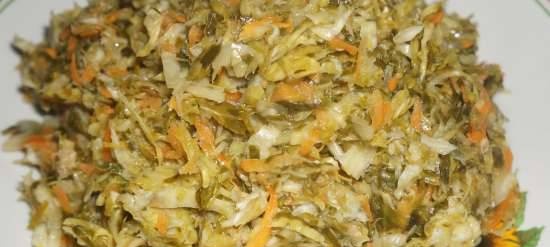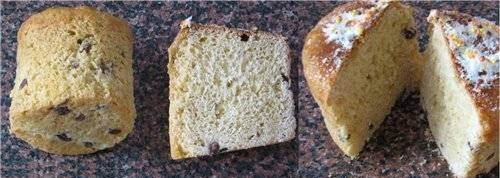Bakery terms
Activated yeast - semi-finished product of bakery production, prepared by activating pressed or dry yeast.
Fermentation of semi-finished bakery products - transformation of carbohydrates and protein substances of dough, sourdough and dough under the influence of the corresponding enzymes of flour, yeast and lactic acid bacteria to an optimal state for further processing.
Bakery products - hearth bakery products weighing 500 g or less, baked from wheat flour.
Bakery products - heating the dough pieces in the baking chamber until they turn into finished products.
Swims - a defect in bakery products in the form of a protruding crumb along the contour of the upper crust in the molded or lower crust in the hearth bakery products.
Glazing of bakery products - application of the heated fondant mass to the top crust of bakery products.
Dividing the dough into dough pieces - obtaining dough pieces of a certain mass.
Diet baked goods - bakery products intended for preventive and therapeutic nutrition.
Dosing of raw materials in bakery production - portioned or continuous weighing or volumetric measuring of raw materials for bakery products in the amount prescribed by the recipe for the preparation of the corresponding semi-finished product.
Additional raw materials for bakery products - raw materials used according to the recipe to increase nutritional value, provide specific orgpnoleptic and physicochemical properties of bakery products.
Liquid yeast - a semi-finished product of bakery production, prepared on fermented tea leaves by multiplying yeast in it. Note. It is allowed to prepare liquid yeast using hop broth.
Welding - semi-finished product of bakery production in the form of a water-flour mixture, brought to the stage of starch gelatinization.
Leaven - a semi-finished product of bakery production, obtained by fermentation of a nutrient mixture with lactic acid bacteria or lactic acid bacteria and yeast.
Fermented tea leaves - brew that has passed the stage of fermentation under the influence of thermophilic lactic acid bacteria.
Kneading of semi-finished products of bakery production - mixing of raw materials for bakery products, provided by the recipe, until a mass of certain structural and mechanical properties is obtained.
Intensive dough kneading - kneading a semi-finished product of bakery production with enhanced mechanical processing.
Preservation of semi-finished products of bakery production - temporary suppression of the vital activity of yeast and lactic acid bacteria in semi-finished products of bakery production in order to preserve their quality for a long time.
Starch paste - finishing semi-finished product of bakery production, obtained by heating an aqueous suspension of starch to the stage of gelatinization.
Magnetic flour cleaning - separation of metal-magnetic impurities from flour when passing it through magnetic installations.
Small-piece bakery products - bakery products weighing 200 g or less.
Cutting dough pieces - applying cuts to the surface of the dough pieces. Note. On the surface of some types of products, pricks or an imprint from a stamp are applied.
Dough rub - mechanical processing of wheat dough for donuts products on a rubbing machine.
National types of bakery products - bakery products, distinguished by the use of local raw materials in the recipe, their characteristic form, the baking method.
Unsweetened tea leaves - brewing, quickly cooled and not subjected to saccharification.
Continuous batching of semi-finished bakery products - kneading of semi-finished bakery products with continuous dosing of a certain amount of raw materials per unit of time.
Nepromes - a defect in bakery products in the form of unmixed raw materials in the crumb.
Sealing dough pieces - processing of dough pieces with hot water.
Frying dough pieces - short-term exposure to high temperature on dough pieces during the first baking period.
Kneading dough - short-term mixing of wheat dough during fermentation.
Form (sheet) processing - obtaining a film on the inner surface of new or cleaned forms (sheets) from a previously applied layer of vegetable oil or a special polymer.
Final proofing - proofing of the dough pieces after their molding in order to loosen and form the required volume.
Rounding dough pieces - making the dough pieces spherical.
Opara - a semi-finished product of bakery production, obtained by kneading flour, water, yeast in accordance with the recipe and technological mode, consumed for making dough. Note: It is allowed to use salt and ready-made dough when preparing the dough.
Spraying dough pieces (bakery products) - moistening the surfaces of dough pieces (bakery products) with water.
Sugared tea leaves - brew, subjected to saccharification under the influence of amylolytic enzymes of flour and malt or enzyme preparations.
Main raw material for bakery products - raw materials that are an essential part of bakery products: flour, yeast, salt and water.
Finishing dough pieces - application to the surface of dough pieces of raw materials for bakery products or finishing semi-finished products of bakery production.
Bakery finishing - giving the surface of the product an appearance that meets the requirements of regulatory and technical documentation.
Finishing crumb - finishing semi-finished product of bakery production from sugar, fat and flour, mixed in a certain ratio and crushed.
Finishing semi-finished products of bakery production - semi-finished products of bakery production, used for surface finishing of dough pieces and finished bakery products.
Dough keeping - keeping the dough for a certain time for the course of physical and chemical processes.
Washing gluten - separation of gluten from starch, particles of crushed shells and water-soluble flour constituents.
Dough filing - adding certain types of additional raw materials for bakery products to the dough during fermentation.
Scalding dough pieces - processing of dough pieces with steam.
Yeast (lactic acid bacteria) nutrient mix - a semi-finished product of bakery production, prepared from flour and water or flour, water and tea leaves, or water and tea leaves in a certain ratio and used in the preparation of liquid yeast (sourdough). Note. When preparing a nutrient mixture, it is allowed to use mineral salts, enzyme preparations, whey, etc.
Preparation of raw materials in bakery production - carrying out technological operations to ensure the suitability of raw materials for bakery products for the production of products.
Hearth bakery products - baked goods baked on sheets or in the baking chamber and cradles.
Explosions - a defect in bakery products in the form of peeling off the crusts at the base of the hearth bakery products and tearing off the upper crust of shaped bakery products.
Semi-finished products for bakery production - semi-finished products obtained from certain types of basic and additional raw materials for bakery products and requiring further processing to turn them into finished products.
Batch batch of semi-finished bakery products - kneading a portion of a semi-finished bakery product for a certain time with a single dosing of raw materials.
Pre-proofing - short-term proofing of dough pieces in order to restore the gluten framework, improve the physical properties, structure and gas-holding capacity after mechanical action during division and rounding.
Prints - a defect in bakery products in the form of surface areas without a crust at the points of contact of the dough pieces. Note: Areas of the surface without a crust at the joints, the presence of which is a characteristic feature of some types of bakery products and the appearance of which is foreseen during the formation of dough pieces, are called slips and are not considered defects.
The production cycle for the preparation of semi-finished products bakery production - preparation of sourdough or liquid yeast by periodically replenishing the nutrient mixture instead of the consumed amount and bringing them to the amount required for production.
Sifting flour - separation of impurities when passing flour through a sieve.
Hollows in baked goods - a defect in bakery products in the form of cavities in the crumb with a transverse dimension of more than 3 cm.
Wiring cycle for cooking semi-finished products bakery production - re-breeding sourdough or liquid yeast by sequential multiplication of microorganisms and bringing these semi-finished products to the production cycle.
Dough cutting - a set of operations for processing the finished dough, including: division, rounding, preliminary proofing, molding and final proofing.
Loosening the dough - the formation of a porous dough structure.
Biological loosening of the dough - loosening of the dough under the influence of carbon dioxide released as a result of alcoholic and partially lactic acid fermentation.
Loosening the dough mechanically - loosening of the dough under the influence of carbon dioxide, oxygen or air supplied under pressure or vacuum to the kneading machine when kneading the dough.
Chemical loosening of the dough - loosening of the dough under the action of carbon dioxide and ammonia, released during the decomposition of chemical leavening agents.
Proofing dough pieces - keeping the dough pieces at a certain temperature and relative humidity.
The rhythm of mixing semi-finished bakery productsa - time interval from the beginning of kneading one portion of a semi-finished product of bakery production to the beginning of kneading the next portion.
Self-sugared tea leaves - a brew subjected to saccharification under the influence of flour amylothyne enzymes.
Fermented brew - brew that has passed the stage of fermentation under the influence of yeast.
Butter bakery products - bakery products with a sugar and fat content of 14% or more according to the recipe.
Dough flaking - imparting a layered structure to the dough by repeatedly applying and rolling out layers of dough and butter or margarine.
Lubrication of dough pieces - applying egg grease or starch paste to the surface of the test pieces.
Lubrication of forms (sheets) - application of a thin layer of vegetable oil or fat emulsion on the inner surface of forms (sheets).
Mixing flour - preparation of a mixture of flour of different grades or different batches, taken in a certain ratio.
Ripening of semi-finished products of bakery production - accumulation of flavoring, aromatic substances of the products of the breakdown of proteins and carbohydrates of flour as a result of autolysis, alcoholic and lactic acid fermentation.
Rusks - semi-finished product of bakery production, obtained by grinding dried bakery products.
Dry starter culture - semi-finished product of bakery production, obtained from ready-made starter culture, dried and ground.
Heat sterilization of bakery products - heat treatment of packaged bakery products.
Thermal refreshing of baked goods - short-term heating of stale bakery products in the appropriate mode.
Dough - semi-finished product of bakery production, obtained by kneading flour, water, yeast, dough or sourdough and additional raw materials in accordance with the recipe and technological mode, serving for the preparation of bakery products.
Dough piece - a semi-finished product of bakery production in the form of a piece of dough of a certain mass, which has undergone one or several cutting operations.
Crumb seals - a defect in bakery products in the form of dense areas of crumb that do not contain pores.
Forming dough pieces - giving the dough pieces after preliminary proofing of the form corresponding to the given type of bread products.
Shaped bakery products - bakery products baked in tins.
Chemical sterilization of bakery products - surface treatment of bakery products with preservatives or packaging in special materials followed by hermetic packaging.
Bread - bakery products weighing more than 500 g.
Bread crumbs - a semi-finished product of bakery production, obtained by grinding bakery products.
Bread lobe - a semi-finished product for bakery production, obtained by grinding pre-soaked bakery products.
Bakery products - food product baked from flour, yeast, salt, water and additional raw materials for bakery products.
Low moisture bakery products - bakery products with a moisture content of less than 19% Note: Low-moisture bakery products include: ram products, rusks, croutons, crispbreads, straws, bread sticks.
Egg grease - finishing semi-finished product of bakery production, obtained from eggs or melange and water by mixing until smooth.







